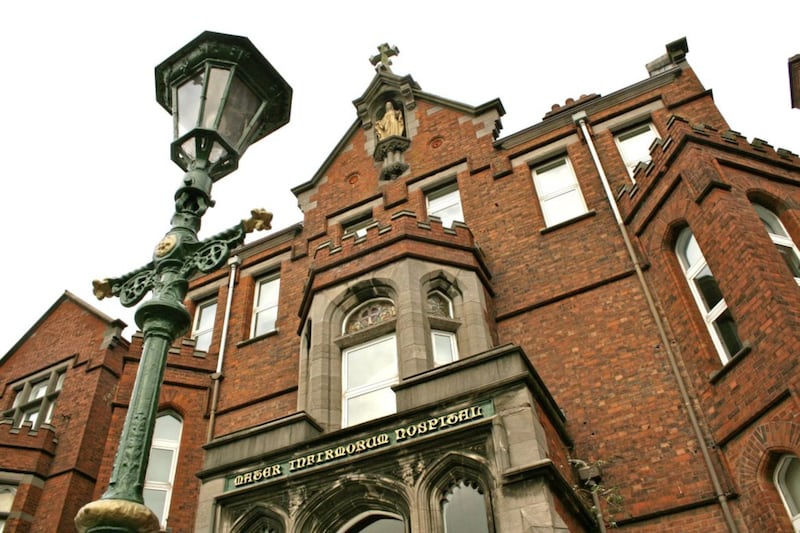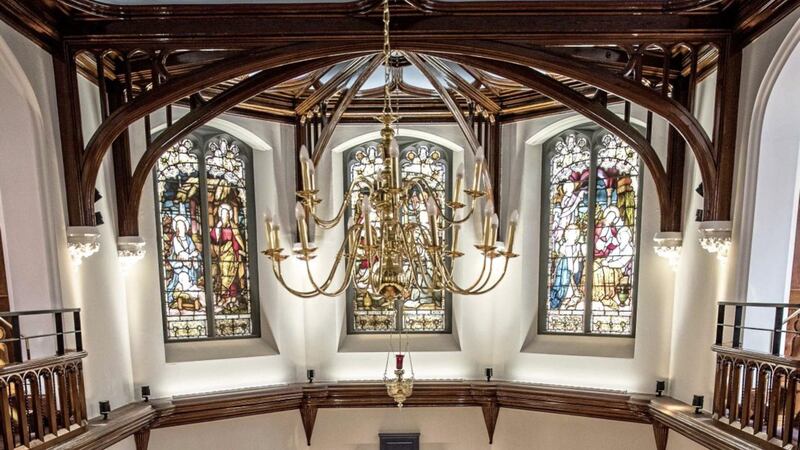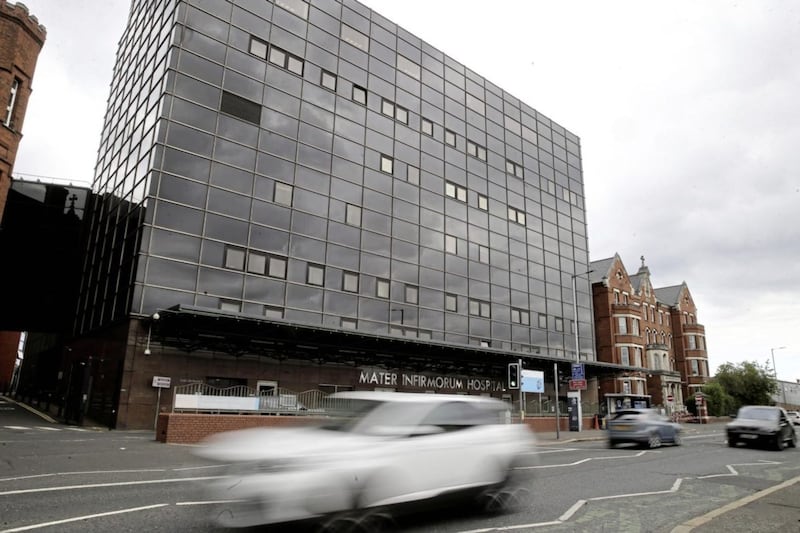"We are workers, not master builders; ministers, not messiahs. We are prophets of a future not our own."
These words, inspired by the life and Christian witness of one of the great martyr-saints of the past century, Oscar Romero, have served for me as something of an anchor, a spiritual locus during this past year.
The effort to restore and renew our beloved Mater Hospital Chapel has been no small undertaking.
The chapel has, since its consecration in 1900, been a privileged place of encounter with Christ and the mysteries of his Church, a sacred space at the heart of our hospital where healing and peace have been experienced by countless patients, families and staff.
The weight of responsibility and expectation has been felt by us all during this great labour of love.
Chaplains, together with our exceptionally gifted and hard-working project team, have had no want of sleepless nights and the emergence of more grey hairs than we would care to count.
The burden has been shared though, by the incredibly supportive Mater family, its dedicated staff, loyal friends and generous benefactors whose charitable donations made possible the project.
The danger in it all, of course, was that we might lose sight of the end goal and the bigger picture; to draw the people we serve into an ever deeper, life-giving relationship with Jesus who heals and saves.
That band of extraordinary women, the Sisters of Mercy, answered with great generosity the call to establish a hospital in Belfast which would care for the sick and dying 'without distinction of creed'
The temptation to be master builders, messiahs, is ever-present to us. None of us is immune to that temptation. But the Romero Prayer, on more than one occasion, has graced me with a purification of motives and a much-needed sense of perspective.
I don't believe our world is a brute fact, the product of mere chance and necessity. I believe things happen for a reason, that there is an ulterior motive behind things and a special purpose running through them.
Life and death, the cycle of the seasons, the passing of time - they belong to a pattern, a plan.
This is a vital idea, for bound up with it is the Christian claim that the story of humankind is exactly that: a story, with a beginning, a middle, a climax and an end. Because our history is a story, it has a meaning: it has a purpose, it is going somewhere.
When we look to the life and death of Oscar Romero, I believe that his story helps us better understand our story, and the story of the Mater.
On Monday March 24 1980, Archbishop Romero was celebrating Mass at the Divina Providencia Hospital Chapel.
He addressed the congregation, praying: "That this immolated Body and this Blood sacrificed for humankind, may nourish our bodies and our blood in suffering and pain, like Christ, not for its own sake, but rather to give the concepts of justice and peace to our people. Let us join together then, intimately in faith and hope..."
At this moment a shot rang out.
The dead body of Archbishop Romero lay slumped at the foot of the altar, the same altar on which the death of Christ is made present every day.
The sight evoked the dead body of Jesus, on the cross, in his mother's arms, a most powerful portrayal of the reality and the cost of love and the opposition it evokes.
The sisters attending that early morning Mass used cloths to soak up and save the blood of their beloved martyr. Not a drop was to be lost or washed away. In their eyes it was simply too precious.
In recalling the facts of that bloody day, I take to heart the powerfully providential fact that he was shot dead not in a university campus, nor in a barrio, nor in a public demonstration, but at the altar of a hospital chapel.
Earlier, in what would be his last Mass, Archbishop Romero remarked: "Those who surrender to the service of the poor through love of Christ will live like the grain of wheat that dies...
"The harvest comes because of the grain that dies... We know that every effort to improve society, above all when society is so full of injustice and sin, is an effort that God blesses, that God wants, that God demands of us."
And he was not afraid to pay the price.
When we look to the story of the Mater, we recall from its earliest chapters the role of martyr-saints like Oscar Romero.
That band of extraordinary women, the Sisters of Mercy, who fearlessly followed Florence Nightingale into the Crimea to care for wounded soldiers, answered with great generosity the call of Bishop of Down and Connor Patrick Dorrian back in the early 1870s to establish a hospital in Belfast which would care for the sick and dying "without distinction of creed".
Those women might not have shed their blood in the service of God and his people, but they certainly gave their lives.

Each day, through toil and sacrifice, they died a little to self so that it was Christ who lived, not they.
Their witness and legacy, together with that of their many cooperators, is our most precious resource, the golden thread which runs through all this hospital's successes so far, and all that it will go on to achieve.
Civic and political representatives have a commendable commitment to serve the common good. In public office, they witness at first hand the importance of social responsibility in building the society we rightly seek.
I would suggest that the Sisters' inestimable contribution to the life and work of the Mater Hospital makes clear that, as we navigate a changing society and the challenges this presents, motives of self-interest will not be sufficient, nor will market forces sustain us.
Something of the gratuity, of the self-gift, of the self-sacrifice that lies at the heart of Christian life is essential.
Faith builds community and it expresses itself in action. As a society, if we are to build on this gift of faith, we must respect its outward expression not only in honouring individual conscience but also in respecting the institutional integrity of communities of faith.
Only in this way will individuals, families and faith communities become whole-hearted contributors to public service and the common good.
You don't need to be a person of faith to acknowledge this truth. It's enough that you be big-hearted and liberal minded.
In 1977, the Queen awarded the then-matron, Sister Ignatius McAvoy, with an OBE. The citation recorded the hospital's "continuing ability to play its full part in treating casualties of all denominations arising out of the current disturbances".
The Mater is located on one of our city's fracture lines. And yet throughout the darkest days of our recent past, it has served as a beacon of light, tending the wounded irrespective of religious or political allegiances.
Moreover, it has blessed members of all our communities with the the opportunity for work and service of neighbour.
It has done so not by diluting its distinctive ethos into some generic mission statement, but by being true to its roots, and by empowering all of us who serve within it to be equally true.
That is how we give authentic witness to those concepts of justice and peace Archbishop Romero spoke of in his final homily.
The Mater is a place which doesn't pretend to collapse difference. It celebrates diversity, and values the unique and enriching contribution we each make as we unite around the common enterprise of caring for the sick and suffering.
On any reckoning, the Mater has a vital contribution to make to the ongoing conversation on the future of healthcare provision in Belfast and it continues to serve as an active agent of peace and reconciliation.
One theologian, commenting on the contribution of Oscar Romero to a broken and wounded El Salvador concluded that "life has the last word".
Perhaps we should make those words our own. We celebrate not so much the glories of human achievement - history tells us the fruits of human endeavour often fail.
Rather, we give thanks for those living stones who have shaped our lives and our life stories into a love story.
Because Christ who is present in the chapel has been the cornerstone of our hospital and the lifeblood of those who have served within it, our world, or at least our small patch of it, has been formed, and transformed, beyond recognition.
Its story might not find its voice in solemn pages of history books, or newspaper headlines, but it is a story that is recorded in the Book of Life, and it is a story which is still being written, on your heart and mine.
- Fr Dominic McGrattan, a priest of the Diocese of Down and Connor, was a chaplain to the Mater Hospital and curate to St Patrick's Church in Belfast. He is now pursuing postgraduate studies at the Catholic University of Leuven, Flanders, Belgium.








